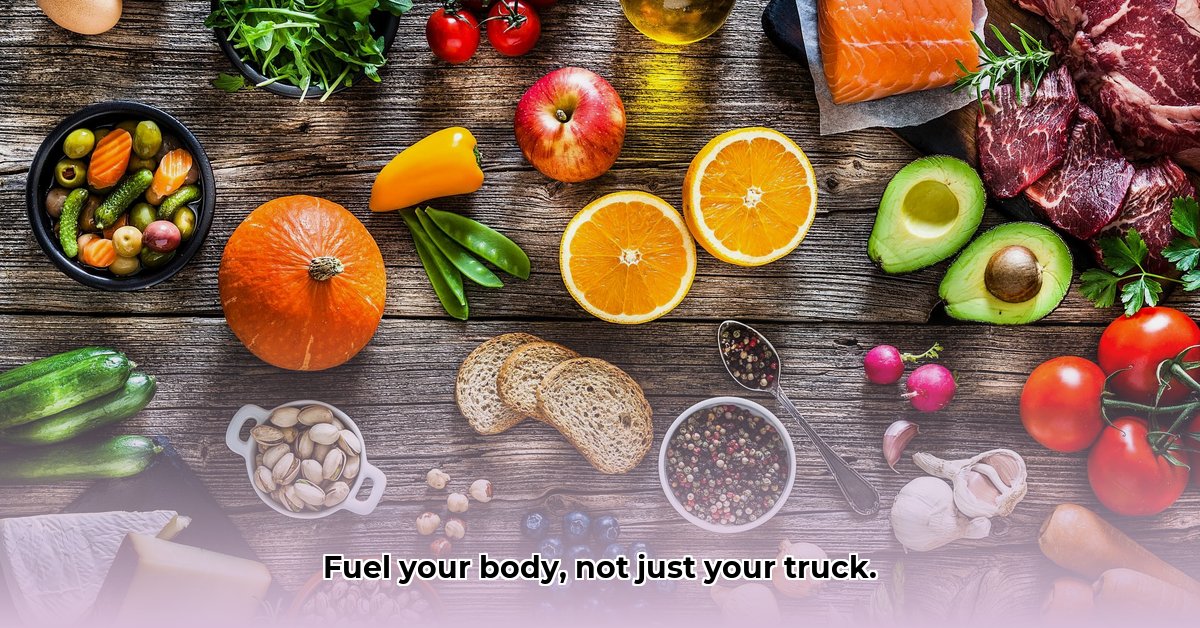Fueling Your Body for the Long Haul: Trucker Health and Wellness
Life on the road presents unique challenges to maintaining a healthy lifestyle, especially when it comes to nutrition. Long hours, irregular schedules, and limited access to fresh, nutritious food can make it tough to maintain a balanced diet. But keeping your body fueled with the right foods isn’t just about maintaining a healthy weight; it’s about having the energy and focus to tackle your job safely and effectively, and it’s about feeling good overall. You wouldn’t put cheap gas in your truck, would you? The same principle applies to your body. This guide provides an actionable framework for truck drivers to embrace healthier eating habits, even amidst demanding schedules. For more tips, check out this helpful guide on healthy trucker eating.
Key Benefits of Healthy Eating for Truck Drivers:
- Increased Energy Levels: Nutrient-dense foods provide sustained energy, combatting fatigue during long hauls.
- Improved Focus and Alertness: A balanced diet enhances cognitive function, crucial for safe driving.
- Better Overall Health: Healthy eating reduces the risk of chronic diseases, promoting long-term well-being.
- Improved Mood: Studies show a link between diet and mental well-being. Healthy eating can lead to a more positive mood.
- Better Sleep: A balanced diet, free from excessive sugar and processed foods, can contribute to improved sleep quality.
Let’s face it, eating healthy on the road isn’t easy, but it is possible with the right knowledge and strategies. According to the Healthy Heads Better Nutrition for Truck Drivers Program, proactive meal planning is a game-changer.
Understanding the Hurdles: Why Trucking Makes Healthy Eating Tough
Let’s be real: eating healthy as a trucker is a struggle. Truck stops often offer limited healthy choices, and cooking on the road is usually out of the question. Long stretches behind the wheel mean fewer opportunities for exercise, and it’s easy to fall into the trap of grabbing convenient, but often unhealthy, fast food. These are all realistic obstacles. However, making gradual, sustainable changes can make a big difference. Consider these common challenges:
- Limited Healthy Options: Truck stops are notorious for greasy food and sugary snacks.
- Time Constraints: Long hauls leave little time for cooking or finding healthy restaurants.
- Sedentary Lifestyle: Hours spent driving contribute to weight gain and related health problems.
- Stress Eating: The pressures of the job can lead to unhealthy food choices.
- Irregular Schedules: Unpredictable hours disrupt regular meal times and healthy habits.
Building Your Road Warrior Meal Plan: A Step-by-Step Guide to Nutrition On The Road
The key to success is planning ahead. Instead of relying on whatever’s available at the next truck stop, take control of your meals. Here’s a plan that’s both realistic and effective:
- The Weekend Prep Session: Dedicate a few hours on Sunday (or your day off) to meal prepping. Think simple, easy-to-transport meals. Grilled chicken breasts, hard-boiled eggs, and pre-cut vegetables are your friends. Portion them into reusable containers for easy grabbing throughout the week. Why does this method work? Preparation prevents poor choices made out of hunger.
- Power-Packed Breakfasts: You need a good start to the day. Some great grab-and-go breakfast ideas include overnight oats which can be combined with rolled oats, milk (dairy or non-dairy), chia seeds, and your favorite fruits in a jar the night before, providing you with ample nutrients; Greek yogurt with granola and berries supplies protein and fiber; or Whole-wheat toast with avocado and a hard-boiled egg gives you a simple yet satisfying combination of healthy fats and protein. Consider also adding protein powder to your oatmeal or yogurt for an extra boost.
- Lunch and Dinner Strategies: Lunch and dinner don’t have to be complicated. Some portable and nutritious options include mason jar salads to prevent soggy salads which you can customize to your liking; whole-wheat wraps or sandwiches, make sure to choose lean proteins such as turkey or chicken; or leftovers from your Sunday meal prep. Try packing your meals in insulated containers to keep them at the right temperature.
- Smart Snacking – The Energy Boosters: Snacking between meals is crucial for preventing energy crashes. Choose nutritious snacks that are easy to pack and store like trail mix that provides a good balance of protein, healthy fats, and carbohydrates; fruits that travel well and don’t bruise easily such as apples, bananas, or oranges; hard-boiled eggs is a great source of protein for sustained energy; or string cheese that provides calcium and protein. Pre-portion your snacks into small bags to avoid overeating.
- Hydration is Key: Always have water readily available. Avoid sugary drinks like soda and juice as they can lead to energy crashes.
Making Smart Choices at the Truck Stop: Truck Stop Nutrition Tips
Truck stops aren’t always ideal for healthy eating, but you can still make better choices. Instead of fried foods, look for grilled options. Salads can be a good choice (just be mindful of creamy dressings). Often you can find fruit like apples and bananas. Yogurt can be a healthy option, but always check the sugar content. Reading nutrition labels is key – pay attention to serving sizes, calories, fat content, and added sugars. Did you know a study reported in 2023 showed that drivers who read nutrition labels consumed 15% fewer calories on average? Here are some more tips:
- Opt for Grilled Over Fried: Choose grilled chicken or fish instead of fried options.
- Load Up on Veggies: Add extra vegetables to your meals whenever possible.
- Be Mindful of Sauces and Dressings: Opt for light vinaigrette or salsa instead of creamy sauces.
- Choose Whole Grains: Select whole-grain bread, brown rice, or oatmeal instead of refined grains.
- Limit Sugary Drinks: Stick to water, unsweetened tea, or coffee.
Incorporating Movement: It Doesn’t Take Much
Sitting for extended periods can be detrimental to your health, even with a good diet. Incorporate simple movement into your routine:
- Take short walks during breaks. Even a 10-minute walk can make a difference.
- Do stretching exercises inside your truck. There are many online resources with simple stretches you can do while seated.
- If it’s safe and practical, consider some light yoga or exercises in the parking lot. Jumping jacks, push-ups against the truck, or squats are all great options.
- Use a resistance band for simple strength training exercises.
Helpful Tools and Resources for Healthy Living
Several tools can simplify your journey towards healthier eating and active living:
- Reusable containers: Invest in sturdy, leak-proof containers to store your prepped meals.
- A cooler bag: Keeps your perishable items fresh, especially during warmer months. A small portable refrigerator can also be a valuable investment.
- Nutrition tracking apps: Apps like MyFitnessPal or Lose It! can help you monitor your calorie intake and macronutrients. These apps can also provide recipe ideas and track your progress.
- Truck stop locator apps (if available): Some apps may list truck stops with healthier food options, though this feature is not always comprehensive.
- Hydration apps: These apps can help you keep track of regular water intake. Set reminders on your phone to drink water throughout the day.
- Portable Blender: Allows you to make smoothies and protein shakes on the go.
- Electric Lunch Box: Heats your prepped meals without needing a microwave.
Hydration: The Often-Overlooked Essential for Health and Wellness
Dehydration can lead to fatigue and decreased alertness. Staying properly hydrated is just as important as healthy eating. Keep a reusable water bottle handy and refill it throughout the day. Aim for at least eight glasses of water per day, or more depending on the climate and your activity level. Consider these tips for staying hydrated:
- Carry a Large Water Bottle: Keep a gallon jug of water in your cab and refill your smaller water bottle throughout the day.
- Set Reminders: Use your phone or a hydration app to remind you to drink water regularly.
- Infuse Your Water: Add slices of lemon, cucumber, or berries to your water for flavor.
- Eat Water-Rich Foods: Include fruits and vegetables with high water content in your diet, such as watermelon, cucumbers, and oranges.
- Avoid Sugary Drinks: Sugary drinks can actually dehydrate you, so stick to water or unsweetened beverages.
Proven Tactics For Building A Healthy Truck Stop Diet: Staying Healthy On Long Haul Routes
| Food Group | Healthy Options | Unhealthy Options |
|---|---|---|
| Protein | Grilled chicken, hard-boiled eggs, lean jerky, tuna pouches, nuts & seeds | Fried chicken, processed meats, burgers, hot dogs |
| Fruits & Vegetables | Apples, bananas, oranges, baby carrots, pre-cut veggies, salads (with light dressing) | Potato chips, candy, pastries, french fries |
| Grains | Whole-grain crackers, oatmeal (instant or pre-made), whole- |
- Compartment Food Containers Make Meal Prep and Lunch Packing Easy - February 10, 2026
- Divided Lunch Containers Revolutionize Your Meal Prep Strategy - February 9, 2026
- Divided Food Storage Containers Transform Meal Prep and Portion Control - February 8, 2026










